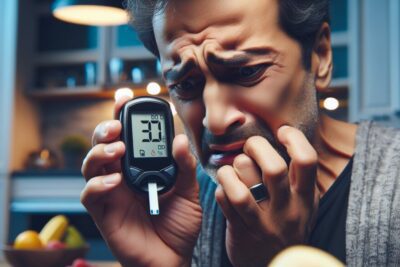
Those managing diabetes are often concerned with how various treatments can affect their blood glucose levels. One such treatment that can have significant implications is the cortisone injection, commonly used to reduce inflammation and pain.
Corticosteroid injections can lead to increased blood sugar levels, a situation warranting attention and careful management for individuals with diabetes. This article will delve into the effects of cortisone injections on blood glucose and how to manage these changes effectively.
🔍 Seeking a breakthrough in Type 2 Diabetes management?
Discover our expert insights and innovative approaches on ‘How to Cure Diabetes’.
Click to transform your health journey today!
What you\'ll find in this article?
- What Is High Blood Sugar Following Cortisone Injection?
- How Long Does Blood Sugar Stay Elevated After Cortisone Injection?
- What Causes High Blood Sugar After Steroid Injection?
- What Are the Signs of High Blood Sugar Following Corticosteroid Injection?
- How Can I Manage My Diabetes After a Corticosteroid Injection?
- What Are the Risks of Steroid-Induced Diabetes?
- How Does a Corticosteroid Injection Affect Blood Sugar Levels?
- Frequently Asked Questions on Blood Sugar and Cortisone Injections
What Is High Blood Sugar Following Cortisone Injection?
Understanding the physiological impact of corticosteroid therapies is crucial for diabetes patients. Cortisone injections can prompt the liver to release more glucose into the bloodstream, leading to elevated glucose levels—a state known as steroid-induced hyperglycemia.
This condition is particularly relevant for individuals with pre-existing diabetes, as their bodies are already challenged in managing blood sugar levels. The additional surge of glucose post-injection can compound the difficulty of maintaining glycemic control.
Monitoring and managing these changes are vital to prevent complications associated with high blood sugar, and understanding this dynamic is essential for effective diabetes care during corticosteroid treatment.








Explore our specialized services in diabetes care 🌟.
From personalized diet plans to effective exercise routines, we have what you need to take control of Type 2 Diabetes.
Visit our services page now!
How Long Does Blood Sugar Stay Elevated After Cortisone Injection?
The duration of increased blood sugar levels after a cortisone injection can vary among individuals. Typically, blood glucose may rise within a few hours after the injection and can remain high for several days.
Factors influencing this duration include the type of steroid administered, the dose, and the individual's sensitivity to steroids. Monitoring blood sugar levels post-steroid injection is vital to ensure they return to the patient’s normal range efficiently.
Patients with diabetes should work closely with their healthcare providers to adjust their diabetes management plan accordingly during this period to mitigate the risks associated with prolonged elevated blood glucose.
What Causes High Blood Sugar After Steroid Injection?
Corticosteroid injections can cause high blood sugar by stimulating the liver to release more glucose and by increasing insulin resistance in the body’s tissues. This means that despite the presence of insulin, the body's cells are less responsive to it, leading to higher levels of glucose in the bloodstream.
The rise in blood sugar is also influenced by the patient's baseline HbA1c levels. Those with lower HbA1c levels may experience a moderate increase, while individuals with higher HbA1c levels might see a more significant spike.
Understanding the interaction between corticosteroids and insulin resistance is crucial for managing diabetes during corticosteroid treatment.
What Are the Signs of High Blood Sugar Following Corticosteroid Injection?
Recognizing the signs of high blood sugar is essential for prompt intervention. Symptoms can include increased thirst and urination, fatigue, blurred vision, and difficulty concentrating. More severe signs might involve nausea, shortness of breath, and dry mouth.
Diabetes patients receiving corticosteroid injections should be vigilant about these symptoms and monitor their blood glucose levels closely to detect any significant changes.
Early detection and management of high blood sugar are imperative to prevent acute complications such as diabetic ketoacidosis, which could necessitate emergency medical care.
How Can I Manage My Diabetes After a Corticosteroid Injection?
- Monitor blood glucose levels more frequently to detect and address any elevations promptly.
- Adjust insulin or medication dosages as advised by a healthcare provider.
- Maintain a balanced diet and consider the timing of meals and snacks to help stabilize blood sugar levels.
- Engage in regular physical activity to enhance insulin sensitivity and lower blood glucose.
- Stay hydrated to help reduce blood sugar levels and prevent dehydration.
It is advisable to have a plan in place before receiving a cortisone injection, ensuring that any necessary adjustments to diabetes management can be made quickly.
What Are the Risks of Steroid-Induced Diabetes?
While cortisone injections are effective for reducing inflammation, they carry the risk of inducing or exacerbating diabetes. Steroid-induced diabetes mirrors Type 2 diabetes, where insulin resistance is a key feature.
Patients without a prior diabetes diagnosis can develop transient hyperglycemia, and those with existing diabetes might face challenges in managing their condition. The risks include not only acute complications like hyperglycemia but also the potential for long-term consequences if glucose levels remain uncontrolled.
Understanding these risks underscores the importance of monitoring blood sugar levels and working with healthcare professionals to adjust diabetes treatment during and after steroid therapy.
How Does a Corticosteroid Injection Affect Blood Sugar Levels?
Corticosteroid injections can lead to elevated blood sugar levels by influencing the body's metabolism of glucose. They can reduce the efficacy of insulin, leading to a temporary state of insulin resistance and increased production of glucose by the liver.
The degree of blood sugar elevation can vary based on the dose of the corticosteroid and the method of administration, with systemic injections having a more pronounced impact than localized injections.
Patients must be aware of these effects to manage their diabetes effectively when undergoing corticosteroid treatment.
Now, let's watch a short video on understanding the impact of cortisone injections on blood glucose levels:
Frequently Asked Questions on Blood Sugar and Cortisone Injections
How Long Is Blood Sugar Elevated After a Cortisone Injection?
Blood sugar levels can remain high for a few hours to several days after a cortisone injection. The duration of this elevation can depend on individual factors such as the type of cortisone injected, the dosage, and the patient’s insulin sensitivity.
Patients should monitor their blood sugar closely during this time and consult with their healthcare provider to determine the best approach for managing these temporary changes.
How to Lower Blood Sugar After Steroid Injection?
To lower blood sugar after a steroid injection, patients can increase their monitoring frequency and adjust their insulin or medication dosages as necessary. Eating a balanced diet, engaging in physical activity, and staying hydrated are also key strategies.
Collaboration with healthcare professionals can provide tailored advice and adjustments to the patient's diabetes management plan during this time.
How Long Will Steroids Affect Blood Sugar?
Steroids can affect blood sugar for several days after administration. The exact time frame varies with the individual's response to the steroid, the dosage, and the type of steroid used.
Close monitoring and appropriate adjustments to the diabetes management regimen are critical until blood sugar levels stabilize.
How to Reduce Blood Sugar Level Immediately?
If an immediate reduction in blood sugar is needed, patients should follow medical advice, which may include taking fast-acting insulin, exercising, or consuming water to aid in flushing out excess glucose. However, these actions should always be taken under medical guidance to avoid hypoglycemia.
Always consult with a healthcare provider before making any significant changes to your diabetes management, especially after receiving a corticosteroid injection.
✨ Other articles you might be interested in:



